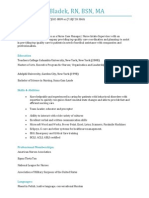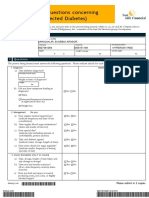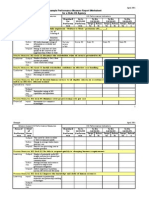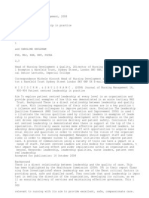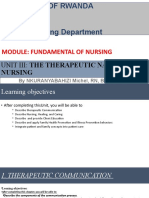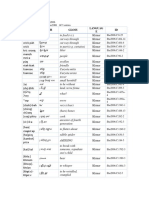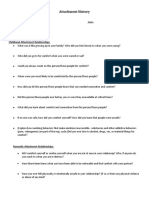0 ratings0% found this document useful (0 votes)
140 viewsNursing and Policy Development
Nursing and Policy Development
Uploaded by
SONGA AmriThe document discusses fundamentals of nursing and the role of nurses in policy development. It defines health policy and outlines how nurses can be leaders, advocates, and agents of change in policy. While nursing involvement in policy has barriers like lack of education and reluctance to enter politics, policy development is integral to nursing practice and nurses must advocate to have their voices heard in shaping policies. The document concludes that now is the time for nurses to take an active role in policy development.
Copyright:
© All Rights Reserved
Available Formats
Download as PPTX, PDF, TXT or read online from Scribd
Nursing and Policy Development
Nursing and Policy Development
Uploaded by
SONGA Amri0 ratings0% found this document useful (0 votes)
140 views30 pagesThe document discusses fundamentals of nursing and the role of nurses in policy development. It defines health policy and outlines how nurses can be leaders, advocates, and agents of change in policy. While nursing involvement in policy has barriers like lack of education and reluctance to enter politics, policy development is integral to nursing practice and nurses must advocate to have their voices heard in shaping policies. The document concludes that now is the time for nurses to take an active role in policy development.
Original Title
Nursing and policy development
Copyright
© © All Rights Reserved
Available Formats
PPTX, PDF, TXT or read online from Scribd
Share this document
Did you find this document useful?
Is this content inappropriate?
The document discusses fundamentals of nursing and the role of nurses in policy development. It defines health policy and outlines how nurses can be leaders, advocates, and agents of change in policy. While nursing involvement in policy has barriers like lack of education and reluctance to enter politics, policy development is integral to nursing practice and nurses must advocate to have their voices heard in shaping policies. The document concludes that now is the time for nurses to take an active role in policy development.
Copyright:
© All Rights Reserved
Available Formats
Download as PPTX, PDF, TXT or read online from Scribd
Download as pptx, pdf, or txt
0 ratings0% found this document useful (0 votes)
140 views30 pagesNursing and Policy Development
Nursing and Policy Development
Uploaded by
SONGA AmriThe document discusses fundamentals of nursing and the role of nurses in policy development. It defines health policy and outlines how nurses can be leaders, advocates, and agents of change in policy. While nursing involvement in policy has barriers like lack of education and reluctance to enter politics, policy development is integral to nursing practice and nurses must advocate to have their voices heard in shaping policies. The document concludes that now is the time for nurses to take an active role in policy development.
Copyright:
© All Rights Reserved
Available Formats
Download as PPTX, PDF, TXT or read online from Scribd
Download as pptx, pdf, or txt
You are on page 1of 30
Fundamentals of nursing
06/14/2021 FON 2020 1
DEFINITION
Policy is defined as a “course of action to
be followed by a government, business, or
institution to obtain a desired effect”
(Nies and McEwen, 2011, p. 200)
06/14/2021 FON 2020 2
Introduction
As we begin a new transition in the health
care delivery system, a variety of
economic, social and political issues will
necessitate the nursing profession's
involvement in policy development.
06/14/2021 FON 2020 3
As with the rich past of nursing leaders,
such as Florence Nightingale who wrote
letters for the improvement of
environmental conditions to enhance
health, to nursing’s role in social reform
in the 1900’s, the involvement of nursing
presence has been instrumental in change
and advocacy.
06/14/2021 FON 2020 4
Cont’d
At a time of rapid change in the health care
arena, the need for clear and concise
policies is essential to promote
communication between and within
organizations to promote population health.
The non-visible skill of nursing practice,
such as policy development, serves as an
intervention for improving health care
outcomes.
06/14/2021 FON 2020 5
Cont’t
Health policy refers to “public
and private policies directly
related to heath care services
delivery and reimbursement”
(Mason, Leavitt & Chafee, 2007,
p. 76.)
06/14/2021 FON 2020 6
Cont’d
Leavitt (2009) expands on this
definition by stating, “health
policies are decisions about the
health of individuals and
communities”( p. 73).
06/14/2021 FON 2020 7
WHO definition : Health policy
refers to decisions, plans, and
actions that are undertaken to
achieve specific health care goals
within a society.
06/14/2021 FON 2020 8
Cont’d
An explicit health policy can achieve
several things:
it defines a vision for the future which in
turn helps to establish targets and points
of reference for the short and medium
term.
It outlines priorities and the expected
roles of different groups; and it builds
consensus and informs people.
06/14/2021 FON 2020 9
The purpose
The purpose of evidence-based
policy is to improve public health
outcomes.
Education program focuses on
preparing students to provide
policy leadership in a variety of
settings.
06/14/2021 FON 2020 10
Graduates will be prepared to:
identify and critically analyze laws,
regulations and policies at the
institutional, local, state and national
levels; to use in-depth knowledge of the
history, structure, theory and process of
health policymaking in the United State;
and to plan, implement, and evaluate
policies.
06/14/2021 FON 2020 11
Cont’d
In addition, they will understand the
economic, ethical, and social
implications of policy decisions for
various affected groups, and be
prepared to creatively and effectively
advocate for policy change.
06/14/2021 FON 2020 12
Implementation of policy development into
nursing practice is still evolving as part of the
role of the nurse.
The need for policy development “is more
than that of an academic enterprise, it is vital if
effective care is to be delivered and resources
used efficiently” (p. 641).
06/14/2021 FON 2020 13
Cont’d
Few nurses are engaged in policy
development and they need to be
“policy-competent,” but are not
involved because they lack clear
guidance on how to accomplish it
(Hewison, 2007; Leavitt, 2009).
06/14/2021 FON 2020 14
The Role of Nursing in Policy
Development
Why nursing? Nurses are trusted by the
public and known for ethics and honesty
(Ulrich, Cunningham, and Wright, 2010).
As identified by Wright (2010), trust and
power are closely related.
Other traits that are vital to policy
development are noted by Leavitt (2009)
and include knowledge and credible
voice.
06/14/2021 FON 2020 15
Furthermore, additional qualities such as
expertise, commitment, persistence,
compassion, vision are described by Wright
(2010).
These attributes, in addition to roles in
leadership, advocacy, and as change agents
(McCracken, 2010); contribute to nurses
involvement in policy development through
the use of the nursing process.
06/14/2021 FON 2020 16
Leader
The role in leadership described by Wright
(2010) is that of being “influential.”
The leadership role expands as a role model to
students as community planners who mobilize
groups to access resources and reform of health
policy (Pauley, MacKinnon and Varcoe, 2009).
Fyffe (2009) relates the development of nurse
competency in the area of policy development
as necessary for nursing leadership.
06/14/2021 FON 2020 17
Advocate
Social justice, access to health care,
concerns for vulnerable populations, and
concerns for health equity have been the
passion that has driven community/public
health nursing practice.
06/14/2021 FON 2020 18
Healthy People 2020 (Department of
Health and Human Services, 2010)
identified the need for building skills in
policy development for the purpose of
caring for vulnerable populations.
Brownson, Seller and Eyler (2010) call
for the elimination of health disparities
as a policy priority.
06/14/2021 FON 2020 19
Change Agent
Nurses need to take an active role in
policy development so others do not speak
for nursing practice.
Public health nursing talents are in
prevention-focused health care and it is
essential for our voices to be at the policy
table whether in government, workplace,
or in our community (Leavitt, 2009,
Hewison, 2007).
06/14/2021 FON 2020 20
Career Possibilities
Nurses with policy expertise are
employed by health services
research firms, work in legislative
and regulatory offices at the
county, state and federal levels, or
hold elective or appointed office.
06/14/2021 FON 2020 21
Others work in the legislative or policy offices
of health maintenance organizations, advocacy
organizations, health care companies or health
care provider associations, or consult for these
and other organizations.
One can also find nurses with careers in policy
and program planning at international
government health organizations and non-
governmental organizations.
06/14/2021 FON 2020 22
Barriers to Nursing Involvement in
Policy Development
Nursing continues to be a female-
dominated profession.
Fyffe (2009) reports nurses are reluctant
to enter into politics, and the political
arena of policy development.
Nurses may fear disclosing the
confidentiality of the nurse-patient
relationship in open discussion.
06/14/2021 FON 2020 23
Cont’d
Cunningham cites a Gallop Poll of 2009 by
the Robert Wood Johnson Foundation
survey titled Nursing leadership from
bedside to boardroom; opinion leaders
perceptions, which supports the opinions
by leaders that nurses lack a structure for
nurses to be heard, have limited
leadership opportunities, no strategic
vision, and differing levels of education.
06/14/2021 FON 2020 24
The survey results find that nursing is last
out of seven possibilities which will
influence health reform in the next five to
ten years.
McCraken (2010) supports this finding by
remarking that nurses “seldom use their
knowledge and skills to be advocates in
policies that support health,” in
particular to older adults (p. 15)
06/14/2021 FON 2020 25
Education in the area of policy
development is limited in academic
programs, and the importance of nurse
leaders as role models for students should
be emphasized (Pauly, et al 2009).
Academic preparation has been
suggested as a mechanism to assist nurses
in valuing and identifying political
involvement (Primomo, 2007).
06/14/2021 FON 2020 26
It is a challenge for nurse educators to teach
students how to translate policy (Leavitt,
2009), because limited time in clinical
experiences prevents immersion experiences
in policy development.
Nursing role models, preceptors, and leaders
are needed to advance learning in the area of
policy development skills for all professional
nurses.
06/14/2021 FON 2020 27
Conclusion
Policy development is integrated into the
scope of practice for nursing.
It is part of our rich history and destiny.
Nurses must play a role in having their
voices heard through policy development.
We are the ‟master of our ship‟ –Now
is the time to take the helm!
06/14/2021 FON 2020 28
References
American Nurses Association. (2007). Public
health nursing: Scope and standards of
practice. Silver Spring, MA: Author.
American Nurses Association. (2005). School
nursing: Scope and standards of practice.
Silver Spring, MA: Author.
Cunningham, J. (2010). Survey says: Nurses‟
influence on health care is untapped. Texas
Nursing. Winter 2010, 12-13.
06/14/2021 FON 2020 29
END
THANK YOU!
06/14/2021 FON 2020 30
You might also like
- Nurs FPX 4010 Assessment 3 Interdisciplinary Plan ProposalDocument6 pagesNurs FPX 4010 Assessment 3 Interdisciplinary Plan Proposalzadem5266No ratings yet
- NHS FPX 6008 Assessment 2 Needs Analysis For ChangeDocument7 pagesNHS FPX 6008 Assessment 2 Needs Analysis For ChangeEmma WatsonNo ratings yet
- Regis NU668 Syllabus FA119Document24 pagesRegis NU668 Syllabus FA119laotzu570No ratings yet
- Fujitsu Dps-450sb A 450w So-319 ReportDocument1 pageFujitsu Dps-450sb A 450w So-319 ReportJohn MachoNo ratings yet
- Nurse Instructor Intake Supervisor Patient Care Manager in NYC Resume Malgorzata BladekDocument6 pagesNurse Instructor Intake Supervisor Patient Care Manager in NYC Resume Malgorzata BladekMalgorzataBladekNo ratings yet
- Diabetes Questionnaire PDFDocument2 pagesDiabetes Questionnaire PDFLourdes Erika CruzNo ratings yet
- SW 4020 Community Analysis PaperDocument6 pagesSW 4020 Community Analysis Paperapi-242943882No ratings yet
- Survey Design Report - MKT 335Document8 pagesSurvey Design Report - MKT 335Dani SantistebanNo ratings yet
- Annotated BibliographyDocument20 pagesAnnotated Bibliographyapi-347153077No ratings yet
- FI Strategic Framework AO2018 - 0014Document8 pagesFI Strategic Framework AO2018 - 0014Tonyboy FaraonNo ratings yet
- The Antidote to Suffering: How Compassionate Connected Care Can Improve Safety, Quality, and ExperienceFrom EverandThe Antidote to Suffering: How Compassionate Connected Care Can Improve Safety, Quality, and ExperienceNo ratings yet
- Question Preparation Exam-1-1Document281 pagesQuestion Preparation Exam-1-1SONGA AmriNo ratings yet
- Winning The Money GameDocument14 pagesWinning The Money GameKeith Windham50% (2)
- Itil 2011 Process ModelDocument1 pageItil 2011 Process ModelTomas GuillermoNo ratings yet
- Chief Nursing Officer InterviewDocument7 pagesChief Nursing Officer Interviewapi-237845240No ratings yet
- Health Care PolicyDocument39 pagesHealth Care PolicyTurikumwe EmmanuelNo ratings yet
- Women's Knowledge and Associated Factors With Preconception Care in EthiopiaDocument10 pagesWomen's Knowledge and Associated Factors With Preconception Care in EthiopiaMegayanaYessyMarettaNo ratings yet
- Issue 30 - The Nurse Advocate - Hamad Medical Corporation - December 2017Document20 pagesIssue 30 - The Nurse Advocate - Hamad Medical Corporation - December 2017Brent ForemanNo ratings yet
- How Does Patient Experience Fit Into The Overall Healthcare PictuDocument9 pagesHow Does Patient Experience Fit Into The Overall Healthcare PictuRodrigoSachiFreitasNo ratings yet
- Formulation: Vision and Mission: Session 2 Ratna Roostika, PHDDocument25 pagesFormulation: Vision and Mission: Session 2 Ratna Roostika, PHDAnonymous iiWoac8kNo ratings yet
- 2010 SWOT Harrison - Chapter5 Health Administration Press, 2010Document7 pages2010 SWOT Harrison - Chapter5 Health Administration Press, 2010Fernando NingunoNo ratings yet
- Slide 1: Disaster Recovery Plan For Vila Health: Berke, Et Al., 2014)Document7 pagesSlide 1: Disaster Recovery Plan For Vila Health: Berke, Et Al., 2014)Ravi KumawatNo ratings yet
- Health Care Workers Motivation and Retention Approaches of Health Workersin Ethiopia A Scoping ReviewDocument7 pagesHealth Care Workers Motivation and Retention Approaches of Health Workersin Ethiopia A Scoping ReviewBSIT2C-REYES, ChristianNo ratings yet
- Self-Assessment Using The Business ExcellenceDocument14 pagesSelf-Assessment Using The Business Excellenceesmaokur0% (1)
- 1 - Strategic Management and Stategic CompetitivenessDocument3 pages1 - Strategic Management and Stategic CompetitivenessStephanie Nicole DiputadoNo ratings yet
- Nurse Leader Nurs 440Document8 pagesNurse Leader Nurs 440api-273238350No ratings yet
- DNP Reflection-SolesDocument5 pagesDNP Reflection-Solesapi-314835119No ratings yet
- Microsoft Balanced Scorecard Framework5Document33 pagesMicrosoft Balanced Scorecard Framework5abcdeNo ratings yet
- Healthcare Systems in India and AbroadDocument25 pagesHealthcare Systems in India and AbroadSwosti Mohanty100% (1)
- 486 AssignmentDocument34 pages486 AssignmentHuỳnh Thị Tú TrinhNo ratings yet
- Lecture Notes - Gens 202 - SUMMARYDocument45 pagesLecture Notes - Gens 202 - SUMMARYebuka75% (4)
- Assignement 2Document17 pagesAssignement 2Gauthier Toudjeu100% (1)
- Balanced Scorecard ExamplesDocument5 pagesBalanced Scorecard Examplesapi-3825626100% (1)
- Property Office DecorumDocument18 pagesProperty Office DecorumRochelle SilenNo ratings yet
- CMN 463 Lecture 2 Insurance Medicare and MedicaidDocument18 pagesCMN 463 Lecture 2 Insurance Medicare and MedicaidCarlos GuiterizNo ratings yet
- The Role of Nurse Practitioners in Care Coordination and TransitionDocument10 pagesThe Role of Nurse Practitioners in Care Coordination and Transitionapi-312364579No ratings yet
- The Healthcare Administrators Desk ReferenceDocument197 pagesThe Healthcare Administrators Desk ReferenceJonathan_Hicks_6507100% (1)
- Project of Business Ethics FinalDocument20 pagesProject of Business Ethics FinalMarwah YaseenNo ratings yet
- A Logic Model For Model Building in Social WorkDocument8 pagesA Logic Model For Model Building in Social WorkJane GilgunNo ratings yet
- Health Systems Strengthening - The University of MelbourneDocument14 pagesHealth Systems Strengthening - The University of MelbourneEstefanía MariñoNo ratings yet
- Patient Centred Leadership in PracticeDocument11 pagesPatient Centred Leadership in Practicerafskall100% (1)
- Syllabus Health Policy and Health Systems 358D 55414 SPR 2015Document7 pagesSyllabus Health Policy and Health Systems 358D 55414 SPR 2015Jose EscarcegaNo ratings yet
- Contemporary Issues in MarketingDocument13 pagesContemporary Issues in MarketingAnshita GargNo ratings yet
- The Importance of TrainingDocument104 pagesThe Importance of TrainingKawalpreet Singh MakkarNo ratings yet
- Occt 650 Personal Leadership Development PlanDocument12 pagesOcct 650 Personal Leadership Development Planapi-233194702No ratings yet
- How Social Marketing Works in Health CareDocument8 pagesHow Social Marketing Works in Health CareMuhammad Shafiq GulNo ratings yet
- Chapter No 6 of LeadrshipDocument28 pagesChapter No 6 of LeadrshipHooriya KhanNo ratings yet
- Meeting Nutritional Needs ElderlyDocument25 pagesMeeting Nutritional Needs ElderlyJustine PlazaNo ratings yet
- Nhs FPX 4000 Assessment 2 Applying Research SkillsDocument5 pagesNhs FPX 4000 Assessment 2 Applying Research SkillsEmma WatsonNo ratings yet
- SickoDocument2 pagesSickodanijela_vuković_3No ratings yet
- Transforming Leadership For Patient SatisfactionDocument4 pagesTransforming Leadership For Patient SatisfactionpietroNo ratings yet
- 1 Nursing ManagementDocument111 pages1 Nursing ManagementMarius Clifford Billedo100% (1)
- UNIT 14 Managing Financial Resources in Health and Social CareDocument4 pagesUNIT 14 Managing Financial Resources in Health and Social Carechandni0810No ratings yet
- Week 3 Social Determinants of HealthDocument57 pagesWeek 3 Social Determinants of HealthFatima RafiqNo ratings yet
- Conference ScheduleDocument18 pagesConference SchedulePutra AginaNo ratings yet
- Strategic Planning Paper MasterDocument14 pagesStrategic Planning Paper Masterapi-429048242No ratings yet
- Cardiology Case Write Up Amirul HamudinDocument9 pagesCardiology Case Write Up Amirul HamudinAmirul HamudinNo ratings yet
- Capstone ProjectDocument4 pagesCapstone ProjectElise D'AgostinoNo ratings yet
- Business Environment Assignment - 1Document9 pagesBusiness Environment Assignment - 1Sohel AnsariNo ratings yet
- National Health PolicyDocument22 pagesNational Health PolicyAncy Varkey100% (2)
- Interprofessional InterviewDocument5 pagesInterprofessional Interviewapi-579620730No ratings yet
- Human Resources Slide 1: NegotiationDocument11 pagesHuman Resources Slide 1: NegotiationKshitij SharmaNo ratings yet
- Self Awareness and LeadershipDocument6 pagesSelf Awareness and LeadershipVikram . PanchalNo ratings yet
- Therapeutic CommunicationDocument69 pagesTherapeutic CommunicationSONGA AmriNo ratings yet
- Mechanism of Promoting IntegrityDocument4 pagesMechanism of Promoting IntegritySONGA AmriNo ratings yet
- Notes of Sexual & Adolescent Reproductive Health From Lecturer, Year 4 Upgrading, 2019-2020Document35 pagesNotes of Sexual & Adolescent Reproductive Health From Lecturer, Year 4 Upgrading, 2019-2020SONGA AmriNo ratings yet
- Shortcuts of IctDocument5 pagesShortcuts of IctSONGA AmriNo ratings yet
- Care To The Digestive SystemDocument16 pagesCare To The Digestive SystemSONGA AmriNo ratings yet
- Mot and EmotionDocument19 pagesMot and EmotionSONGA AmriNo ratings yet
- DV-2019 Submission Confirmation: Entry Received Success!Document1 pageDV-2019 Submission Confirmation: Entry Received Success!SONGA AmriNo ratings yet
- Notes First Aid 1Document39 pagesNotes First Aid 1SONGA Amri100% (1)
- Spatial and Temporal SummationDocument11 pagesSpatial and Temporal SummationSONGA AmriNo ratings yet
- Uwiteka Ni Wowe Mana YanjyeDocument1 pageUwiteka Ni Wowe Mana YanjyeSONGA AmriNo ratings yet
- Aluminum/ Magnesium Carbonate Chewable Tablets Are Used ForDocument8 pagesAluminum/ Magnesium Carbonate Chewable Tablets Are Used ForSONGA AmriNo ratings yet
- Role of Ict in Health SectorDocument14 pagesRole of Ict in Health SectorSONGA Amri100% (1)
- Bodty's Response To ExerciseDocument20 pagesBodty's Response To ExerciseSONGA AmriNo ratings yet
- Types of MusclesDocument23 pagesTypes of MusclesSONGA AmriNo ratings yet
- Foodborne: Tific Discipline Describing Handling, Preparation, and Storage of Food in Ways That Prevent Food-Borne IllnessDocument1 pageFoodborne: Tific Discipline Describing Handling, Preparation, and Storage of Food in Ways That Prevent Food-Borne IllnessSONGA AmriNo ratings yet
- AbsorptionDocument8 pagesAbsorptionSONGA AmriNo ratings yet
- Christmas Tree Pests FC Field Book 17 Fcfb017Document104 pagesChristmas Tree Pests FC Field Book 17 Fcfb017Chromaticghost2No ratings yet
- Briefing On ProposalDocument9 pagesBriefing On ProposalSyaiful Ashraf Mohd AshriNo ratings yet
- SPM Form 4 Chemistry Chap 4 ExercisesDocument14 pagesSPM Form 4 Chemistry Chap 4 ExercisesTee Xin Rui67% (3)
- Custom Dictionar1Document48 pagesCustom Dictionar1Chem VathoNo ratings yet
- FAM L QuestionDocument134 pagesFAM L Questionpeggiezhu5No ratings yet
- What Are The Engineering and Physical Properties of StonesDocument3 pagesWhat Are The Engineering and Physical Properties of StonesDeven PatleNo ratings yet
- 06 Asme Teoria de MaterialesDocument340 pages06 Asme Teoria de MaterialesalexNo ratings yet
- Flange - WikipediaDocument6 pagesFlange - Wikipediaramthecharm_46098467No ratings yet
- The EPC PDFDocument64 pagesThe EPC PDFwil1No ratings yet
- Salt Analysis.4Document3 pagesSalt Analysis.4Rohain KoulNo ratings yet
- Acme Laboratories Ltd. - Unsolicited-PtdDocument13 pagesAcme Laboratories Ltd. - Unsolicited-PtdnasirNo ratings yet
- Export-Import Documentation and Risk Management in Export-Import BusinessDocument32 pagesExport-Import Documentation and Risk Management in Export-Import BusinessSaptarshi Roy100% (1)
- Renewal of Your Optima Restore Floater Insurance PolicyDocument4 pagesRenewal of Your Optima Restore Floater Insurance PolicyAarti BalmikiNo ratings yet
- User Guide: IdealDocument8 pagesUser Guide: IdealIonuţ CreţuNo ratings yet
- Laundry WastewaterDocument9 pagesLaundry WastewaterMhelveneNo ratings yet
- ATTACHMENT HXDocument2 pagesATTACHMENT HXMaria NistorNo ratings yet
- 11.6.x.22.paper FinalDocument15 pages11.6.x.22.paper FinalGemma CohnNo ratings yet
- Ifs Brochure North-AmericaDocument2 pagesIfs Brochure North-AmericajeedanNo ratings yet
- Compartment Syndrome Hand and ForearmDocument33 pagesCompartment Syndrome Hand and ForearmProfesseur Christian Dumontier100% (2)
- Chapter 4 - Personality and ValuesDocument3 pagesChapter 4 - Personality and ValuesPhạm Châu Thuý KiềuNo ratings yet
- Mechanical Engineering Applied-Thermodynamics Refrigeration NotesDocument24 pagesMechanical Engineering Applied-Thermodynamics Refrigeration Notesminesh.manu6531No ratings yet
- 7 2022 - Gas Grid Training (Part 1) FluxysDocument41 pages7 2022 - Gas Grid Training (Part 1) FluxysJesús CastellanosNo ratings yet
- Xyiqlr: Reservation DetailsDocument5 pagesXyiqlr: Reservation DetailsxxxNo ratings yet
- Calculating Macronutrients EbookDocument36 pagesCalculating Macronutrients EbookPiyush100% (6)
- Executive Position Profile - President of RiseDocument7 pagesExecutive Position Profile - President of RiseLars Leafblad100% (1)
- HT CORROSION INHIBITOR 1.3 ADocument1 pageHT CORROSION INHIBITOR 1.3 ATrue StoryNo ratings yet
- Late SSSTDocument121 pagesLate SSSTSEIYADU IBRAHIM KNo ratings yet




